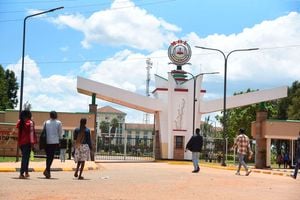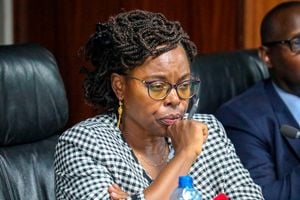
Kenya Secondary Schools Heads Association (Kessha) boss Willy Kuria addressing the press during a past conference in Mombasa.
Successive, unfulfilled promises by the government to release funds to public schools have left head teachers, workers and learners in a desperate situation.
Many schools are unable to meet basic needs such as food, sanitation, security, teaching materials, and even electricity.
The situation is so bad that some principals have kept off schools to avoid the shame of suffering children, even as they dodge suppliers who have been camping at their offices daily since last year.
In a national secondary school at the Coast, non-teaching staff and contracted teachers are on a go-slow due to salary arrears dating back to late 2024.
The chief principal of the school, banking on promises by both the National Treasury and the Education Ministry, had promised to clear the arrears of 20 workers when schools reopened on January 6.
“It’s now three weeks since we reopened and there’s no money in our accounts. What will I pay them with? I have been forced to hide and let the deputy take charge because I can no longer tell more lies. I am in anguish,” the chief principal told the Nation on condition of anonymity, citing possible reprisals.
A head teacher in Bungoma County raised concerns over the dire state of schools in the region, citing a lack of essential resources and services.
“I don’t know how the government wants us to operate because there are no books, and my school is in the interior. We don’t even have a gate, and our two watchmen resigned. I am in limbo because the teachers don’t even have chalk. My teachers have to contribute money so that we can buy lunch. It is embarrassing, to say the least,” he said.
Another administrator said her school has been taking food on credit from local suppliers with the debt pilling every day. She said the situation had worsened, forcing the school to introduce food rations for students.
To reduce costs of electricity and water, the principal said, the learners, including girls, have to bathe once a day. They have also scrapped morning and evening preps in a bid to reduce electricity bills.
“You cannot tell students, especially boys, that there’s no food… they will burn down the school. So for the sake of sanity, I would rather send them home. Why would I keep over 2,000 boys in school and there’s no food, water and electricity was disconnected?” charged another principal.
This came as unions and individual head teachers denied receiving capitation, which Education Cabinet Secretary Julius Ogamba on Thursday said was disbursed for the free day secondary school education programme on Wednesday.
Speaking in Mombasa, Mr Ogamba said the Treasury had sent Sh19 billion out of Sh48 billion expected this term, as he assured head teachers and principals that the government would address other pending challenges within two weeks.
“This term had a bit of a challenge. We were supposed to receive Sh48 billion but we were able to receive Sh19 billion on January 22, 2025, which has already been disbursed to schools. Another Sh15 billion will be disbursed tomorrow (January 24, 2025),” the CS said at Umoja Comprehensive School during the inspection of schools in the county.
Mr Ogamba said the Treasury would complete the disbursement within two weeks to ensure schools have enough resources.
“We are asking head teachers not to send children home because funds are coming to their accounts. But those who bank with KCB have already received capitation for Junior Secondary Schools,” he added.
Kenya Secondary Schools Heads Association (Kessha) National Chairman Willy Kuria differed from Mr Ogamba’s position, saying schools had yet to receive a penny from the National Treasury.
The Sh19 billion, Mr Kuria said, is also less than what schools were expecting as capitation.
“So how much has been disbursed per student? The money is less than half of what we expected, more so it will be gobbled up by the debts by the time it lands in our accounts,” said the Muranga High School chief principal.
The Sh48 billion is 50 percent of the capitation due to schools this academic year. When schools reopened for the first term, the CS explained that the capitation would be disbursed as free primary education (Sh4.1 billion), free day junior school education (Sh15.3 billion) and free day secondary school education (Sh28.9 billion).
In Term Two, schools are supposed to receive 30 percent of the capitation, while the balance of 20 percent will be disbursed in Term Three.
National Chairman of the Kenya Primary Schools Head Teachers Association (Kepsha) Johnson Nzioka decried the State’s unfulfilled promises, saying they had left teachers in embarrassing situations.
"The government assured us that funds would be disbursed before the term started, but this was not the case. We were promised the money would come within a week, yet weeks have turned into months. Schools are now running on credit, and this is severely affecting the morale of teachers and the quality of education," he said.
He said the financial crisis facing public schools, which number over 23,000 across the country, is deepening by the day, with some schools literally running on empty
“How does the government expect the schools to function? When we closed schools we had no money; opening the schools, still, there is no money. This is embarrassing because every day, suppliers come to our offices asking for payment. It’s embarrassing and demoralising,” said Mr Nzioka.
A principal in Kakamega said; “running a day school has become a nightmare—no funds, no food, no essentials. The school owes every shop nearby—nails, food, sugar—you name it. My teachers are too embarrassed to step outside; the mounting debts have turned their lives into a daily shame.”
Mr Nzioka called on the government to expedite the release of funds to prevent further deterioration of the education system, highlighting the need for a sustainable strategy to ensure timely funding.
"We cannot continue to operate like this. Schools are running on empty, and the trust in the system is eroding. We need immediate action. And this starts from last year, which they are supposed to pay 50 percent they paid 25 percent, we need action,” said Mr Nzioka.
Kenya Union of Post Primary Education Teachers deputy secretary-general Moses Nthurima revealed that the government still owed schools Sh7,000 per learner from last year. Cumulatively, unions say, schools are owed more than Sh64 billion for the last four years.
“While the government saves money, the loss in educational opportunities far outweighs any benefits. Although 27 percent of the national budget (Sh656 billion) is allocated to education, much of it goes toward paying school bills, leaving little for actual learning,” Mr Nzioka said.
“This year, the Ministry of Education has only disbursed Sh15,240 per student, leaving a balance of Sh7,000 out of the Sh22,000 per student. An additional Sh20-64 billion remains undisbursed, yet the government continues to claim it supports access to education.”
A member of the National Assembly Education Committee Peter Orero said capitation is the biggest challenge affecting learning in secondary schools.
Mr Orero, an educationist with over 30 years’ experience, said during the late President Mwai Kibaki’s reign when free day secondary school was introduced, the State used to inject Sh22,000 capitation per student which enabled the institutions to run smoothly.
“But as we moved on the capitation was reduced to Sh17,000 per student annually. But not all of it is disbursed to schools on time. If we are serious about education, we should make all the day primary and secondary schools free. We must alleviate the lack of funds in our schools,” said Mr Orero.
The Kibra MP said secondary schools have huge pending bills.
“We need to be very intentional and purposeful in our approaches towards solving critical problems facing schools in this country,” said Mr Orero.
“Some principals are in a great dilemma. You are given over 3000 students to manage without funding. What do you think they would do? Of course, ask parents to fill the void. The government must take responsibility.”
Additional reporting by Vitalis Kimutai











